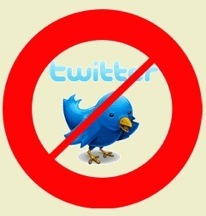I don’t love Twitter. There, I’ve said it. Why?
First, because it contributes to a deluge of information that is so prevalent in our society. Newsweek magazine recently published an interesting article about how many of us are suffering from “information fatigue.” As a society, many of us are exposed to more and more information. Social media, e‑mails, advertisements, junk mail, television, radio, and newspaper and magazines offer us an unparalleled amount of news and entertainment. But all these choices can lead to “infobesity” (see my related blog post). Most of us think that more choice is a good thing but when people are faced with too many choices they make no decision.
Here’s one example cited in Newsweek. “In a 2004 study, Sheena Iyengar of Columbia University and colleagues found that the more information people confronted about a 401(k) plan, the more participation fell: from 75 percent to 70 percent as the number of choices rose from two to 11, and to 61 percent when there were 59 options. People felt overwhelmed and opted out.”
Those people who soldiered on and attempted to make a decision often make poorer choices. Researchers found that people exposed to too much information “reach cognitive and information overload…They start making stupid mistakes and bad choices because the brain region responsible for smart decision making has essentially left the premises.”
Second, the stream of Tweets is relentless. According to the Newsweek article, researchers also found that “recent information” hampers our ability to make good decisions. “We pay a lot of attention to the most recent information, discounting what came earlier…We’re fooled by immediacy and quantity and think it’s quality,” says Eric Kessler, a management expert at Pace University’s Lubin School of Business. “What starts driving decisions is the urgent rather than the important.”
Third, I don‘t love Twitter because most of the posts are, well, boring. I don‘t care about what people had for lunch.
Fourth, lack of time. I don‘t have a lot of free time after working full time, parenting, attempting to exercise a few times a week, and keeping up with friends and family. I hardly watch any television. So I don‘t understand how people have time to follow more than 700 individuals on Twitter. I used to think Twitter was the social media platform for teenagers. But according to a statistic from last year, more than 45 percent of Twitters users are 18 to 34 years old and 24 percent are 35 to 49 years old (website-monitoring.com from May 2010).
To summarize, I think Twitter has value when it‘s used in certain situations (check out the recent blog post I wrote about integrating Twitter with technical documentation). But in general, it contributes both to the deluge of information (most of it not very interesting or useful) and to the continuous real-time onslaught of information that is considered recent. Having said all that, I am going to try to use it more in 2011 to reach out to other technical writers. Just don‘t expect me to love it.

 I have worked as a
I have worked as a